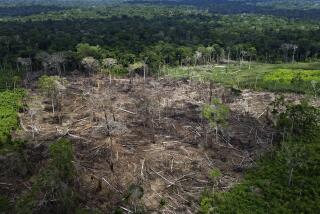Losing the Forests as Well as the Trees : * ‘Truly Horrendous’ New Evidence on Deforestation
- Share via
A decade ago the U.N. Food and Agriculture Organization estimated that the world was losing its vital tropical forests at the staggering rate of 28 million acres a year. Since then things have become worse.
The Washington-based World Resources Institute, in a study prepared in collaboration with the United Nations, now places annual tropical forest losses at between 40 million and 50 million acres a year. Each year, forests about the size of the state of Washington disappear from the face of the Earth.
Does it much matter to a resident of Los Angeles or London or Leningrad if trees are felled at an accelerating rate in the jungles of Brazil or Indonesia or Thailand? It matters a great deal.
Tropical forests absorb huge amounts of carbon dioxide, the main contributor to the greenhouse effect, the buildup of gases in the atmosphere that work to trap solar radiation. As forests shrink, the Earth’s ability to recycle carbon dioxide declines. Adding to the problem is that tree cutting is almost always followed by burning of the underbrush, releasing even more carbon dioxide into the air. The result, in the view of many scientists, is to bring closer the time when the planet will begin to warm up, producing profound changes in its ecosystems.
There are no easy ways to control deforestation. Concentrated in developing countries with rapidly growing populations, deforestation is a many-sided problem that is sustained by government policies on land tenure, by private greed, and by the survival-driven need of the landless to practice subsistence agriculture even on barely fertile forest soil. Some governments--Brazil’s and Costa Rica’s come to mind--have taken laudable if modest steps in recent years to slow the rate of destruction of the tropical forests. But overall, as the latest analysis of satellite photos indicate, those efforts are not enough.
More is at stake in deforestation than the threatened warming of the Earth, however. Perhaps half of all the world’s hundreds of thousands of plant and animal species are native to tropical forests. Scientists fear the extinction of literally tens of thousands of these species as the forests recede. A source of particular concern is the loss of plants that could provide the natural substances for curing or controlling many diseases.
Sen. Patrick Leahy (D-Vt.), Agriculture Committee chairman, describes the new evidence on deforestation as “truly horrendous.” That does not seem to be an overstatement. Set against the long-term environmental implications of deforestation, most day-to-day political problems tend to appear inconsequential indeed. The trick now is to get political leaders to agree with this assessment. Only then, maybe, will effective remedies--like strictly administered and policed development policies that encourage environmental protection and discourage the unbridled exploitation of limited resources--begin to evolve.
More to Read
Sign up for Essential California
The most important California stories and recommendations in your inbox every morning.
You may occasionally receive promotional content from the Los Angeles Times.













